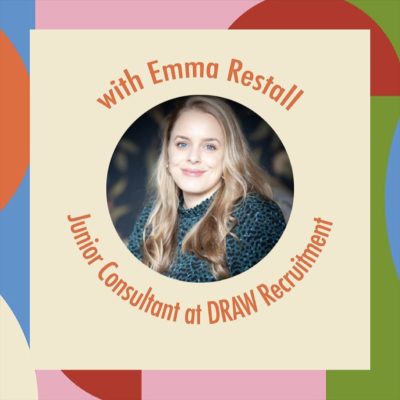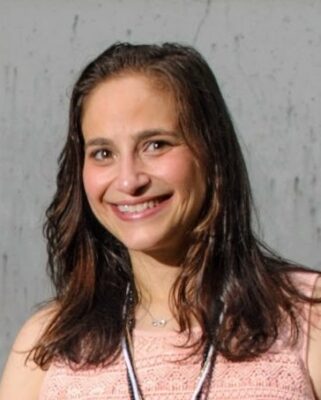Our Junior Consultant Emma spoke with Matilda from Hang It Collective, a great new resource for recent arts graduates https://www.hangitcollective.com/, about job hunting as a recent arts graduate. You can still listen to the podcast on their website or read the transcript below.
MM: We’re now going to take a quick break from the job hunting conversation and jump to an interview I did with Emma Restall, a Junior Consultant for DRAW Recruitment, which is an arts recruitment company. We chat about her role and what’s involved in working with a recruiter, especially as a young graduate.
ER: Hi Matilda! My name is Emma, I’m one of the junior consultants here at DRAW. We focus on recruitment within the arts and my job is to speak to junior candidates and recent grads like yourself. Help them with their job search.
MM: Amazing! Could you describe DRAW for me and the role of a recruiter?
ER: We’re a small recruitment team and we focus on job searches within the arts. The role of the recruiter is to find the right match for roles that our clients need assistance with and to assist our candidates with their job search.
MM: And why should graduates consider using DRAW Recruitment rather than directly applying to a company?
ER: Well it’s a very tricky time for recent graduates so I think any extra help is useful. But not only can we advise you on your CV and the state of the current job market but our blog has a lot of resources for finding jobs, working out what’s right for you, interview tips and as mentioned CV advice. I focus on the junior searches and I really enjoy talking to recent graduates, like yourself, and helping them. Unfortunately, entry-level jobs have really taken a hit during the pandemic but with the promise of things reopening, we hope to see a lot more coming up.
MM: And what’s your target client group?
ER: We have quite a diverse range of clients within the visual arts. Prominently commercial arts galleries and auction houses. But our clients also range from small family-run antiques dealerships to art technology platforms, editorials, blue chip galleries and everything in between.
MM: Could you talk a little bit about the process and what’s expected of an applicant working with you?
ER: There are no expectations, we’re here to help. What we do is: you send us your CV and we’ll register you on our database and that means that you can come up in any searches that we do for a role. Moving forward, we would have a chat with you, before the pandemic that would be in person, so we can get to know you and understand what you’re looking for. Now we do that via Zoom and then moving forward, when a role comes in that you’re suitable for we can have a chat about that and put you forward and hopefully you’ll get a job. One of the Hang It Collective founders was placed in her current role by DRAW Recruitment.
MM: I think there are a lot of misconceptions or at least I didn’t really understand what a recruitment company was before talking to you at DRAW. Do recruitment companies take a cut from your pay when they find you a job?
ER: No, not at all. It’s actually against the law to charge for job seeking services so an agency could charge you for CV services or something along those lines but it’s against the law to charge for job seeking services so we’re here to give you free help.
MM: That’s good to know! So don’t trust a recruitment company that asks for a cut. And what is it about recruitment in the arts that is so different from other fields?
ER: So in terms of the process of recruiting, I wouldn’t say it’s that much different, each sector has different requirements that will need to be fulfilled for a specific role. What is different is, in the art market there is a strong prevalence towards internships and volunteering compared to other sectors. This is because most organisations are small, mid-size companies that don’t have the capacity to do more corporate traineeships or graduate schemes. And I know you’ve done a whole podcast on the subject of internships! Because of the size of the art world, because it is still quite small compared to other sectors, we take a personal approach to recruiting. We’ve all worked in various positions within the arts and so when we meet candidates and put them forward for a role, we know they’re a good fit.
MM: And you work specifically with people looking for entry-level jobs, do you have any advice for young graduates looking for work at this difficult time?
ER: It’s so difficult for a new grad in the arts at the best of times, obviously the current circumstances are extremely challenging so I would suggest doing as much networking and outreach as possible from home, LinkedIn is a good place for this. If you have any academic or side hustles that you’re doing then make sure they’re mentioned in your CV. Any work experience at the moment is good, whether it is within the arts or not, I think of lot of people assume that non-arts related experience is not relevant but particularly at the moment it really is. Good admin skills, database experience, digital marketing, all these skills are very transferable to roles in the arts. Any employer looking at your CV at this time will understand and it looks really good that you’ve been proactive and working, even if that’s in a supermarket.
MM: And you speak with employers all the time. What’s the most important thing they look for on a CV?
ER: That’s a tricky question actually. It really depends on the role that is being hired for. However I think the most important thing is that your CV is concise and coherent, with no typos. An employer will spot a typo that has been missed, so matter how many times you’ve proofread it.
MM: Well thank you so much for talking to me. Obviously we’ve got DRAW recruitment on the website under resources so our listeners can find you there.
ER: Yes! Please do get in touch with me if you are a recent graduate in the arts, my email is emma@drawrecruitment.com and we’d love to have your CV on file and have a chat with you about what you’re looking for and at this time to offer some reassurance because it is a bit miserable and difficult so that’s what we’re here for. Hopefully with commercial galleries being able to open things will pick up and we can all go onwards and upwards.
Notes from DRAW · 30.04.2021





